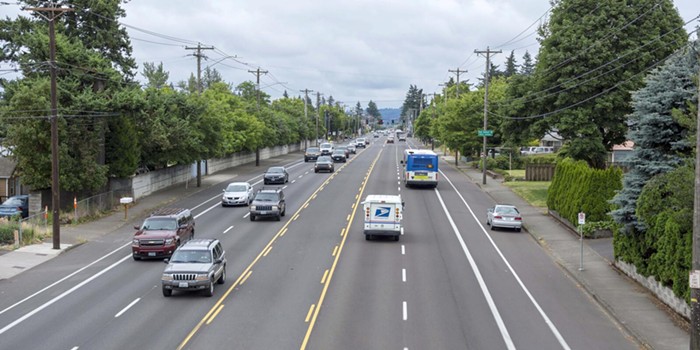PORTLAND'S POLICE discipline process has lately been earning reprimands of its own. Most everyone agrees it’s not adequately doing the job it was designed for: punishing errant Portland cops.
Now, after Portland’s auditor scrapped a controversial plan that could have pushed that discipline system behind closed doors, Portland City Council will likely vote next week on an alternate proposal to speed up the complaint process against police.
If approved by council, the plan will leave Portland’s 11-member Citizen Review Committee (CRC) intact rather than merging it with the more secretive Police Review Board (PRB). That means people unsatisfied with how the police bureau handled their complaints will be able to air those grievances in public.
Now, though, Auditor Mary Hull Caballero says appeals should be heard in front of three-person panels—so hearings can happen more often without taking up more time for individual members. And most controversially, Hull Caballero wants to rein in the public comment segments that have been a mainstay of the sometimes-unruly appeals process.
As proposed, time for public comment—which is almost always in favor of the person complaining against the cops—would only be held during general CRC meetings. It’d be abandoned entirely from hearings that consider appeals.
Constantin Severe, director of the auditor’s Independent Police Review (IPR), says the new proposal was one of three that came out of secret focus groups earlier this year, along with the idea to merge the CRC and PRB, and a proposal in which an administrative law judge would decide the outcome of appeals. Those models were trying to solve a basic problem: The complaint process needs to speed up so the city will be in compliance with US Department of Justice guidelines.
City council favored the original consolidated model, Severe says. CRC members essentially threatened mutiny.
“There was so much negative reaction to holding meetings in a non-public setting,” says CRC member Jim Young. “There was so much backlash that the auditor came up with an alternative proposal.”
The proposal that council will likely vote on next week, many say, is better than the old one. Still, some criticize it for not doing enough to address structural problems within the police accountability system. Others criticize the size of the panels that will hear appeals. All criticize the elimination of public comment during appeal hearings.
“With the CRC, you can safely say 100 percent of the members are against the elimination of public comment,” says Young. (Young had a cup of water thrown in his face by an activist during the public comment portion of a particularly raucous meeting in March. That activist, Charles Johnson, was convicted last week of harassment and sentenced to seven days in jail.)
In a town hall meeting at Maranatha Church in late August, city attorneys Ellen Osoinach and Mark Amberg said they recommended axing public comment from appeals hearings because cops could potentially file a grievance that the board improperly made a ruling based on something an audience member said.
Has that happened before? Nope, the scenario was purely hypothetical.
Portland Copwatch’s Dan Handelman, one of the most respected and listened-to voices during the CRC’s public comment periods, criticized the plan, comparing the first and second proposals to “getting hit in the head with a baseball bat” and “getting hit in head with a lead pipe.”
“I don’t want to get hit at all,” he said. “Given the choices between private hearings we can’t go to, or public hearings where we can’t speak—that’s not really a choice. We need to have public hearings where the public can have input, or else the whole system is not going to be trusted by the community.”
At a meeting last week, CRC Chair Kristin Malone toyed with the idea of scheduling a general meeting directly after appeal hearings, so the body can at least get public comment after it casts a vote.
“But that’s not a long-term measure,” Malone said. “If one meeting needs to be adjourned and one needs to begin, so be it, but that seems like a bad idea.”
The CRC’s Julie Ramos criticized the size of the three-person panels that might decide the outcome of appeals, as they wouldn’t reflect all the views of the relatively diverse board.
“I don’t think a panel of three gives enough representation of this group,” Ramos said last week. “I would like to see the panel grow a little bit to four or five members.”
Young tells the Mercury that the new proposal doesn’t do much to aid what’s really hindering the CRC: that it’s limited in what it can review. The CRC can only vote on whether the decisions made by police to clear their officers of complaints could have been made by a “reasonable person,” regardless of whether members actually agree. What the committee really wants is to be able to rule on the cases based on available evidence.
The proposal “does not deal with the overall complexity of the situation or the standard of review,” Young says. “It’s a good interim step for a first initial band-aid. If they think this will solve all their problems, they’re sadly mistaken.”
City council will hear the new proposal on Wednesday, September 14. Barring any change, they will vote on whether to approve it on September 21.


















